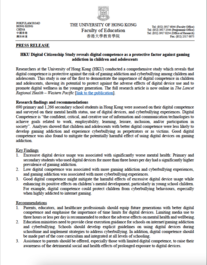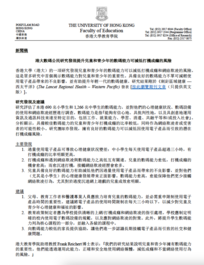Press Release: HKU Digital Citizenship Study reveals digital competence as a protective factor against gaming addiction in children and adolescents
新聞稿:港大數碼公民研究發現提升兒童和青少年的數碼能力可減低打機成癮的風險
Updated on February 09, 2022 (Wed)
HKU Digital Citizenship Study reveals digital competence as a protective factor against gaming addiction in children and adolescents
Researchers at the University of Hong Kong (HKU) conducted a comprehensive study which reveals that digital competence is protective against the risk of gaming addiction and cyberbullying among children and adolescents. This study is one of the first to demonstrate the importance of digital competence in children and adolescents, showing its potential to protect against the adverse effects of digital device use and to promote digital wellness in the younger generation. The full research article is now online in The Lancet Regional Health – Western Pacific [link to the publication].
Research findings and recommendations
690 primary and 1,266 secondary school students in Hong Kong were assessed on their digital competence and surveyed on their mental health status, use of digital devices, and cyberbullying experiences. Digital Competence is “the confident, critical, and creative use of information and communication technologies to achieve goals related to work, employability, learning, leisure, inclusion, and/or participation in society”. Analyses showed that children and adolescents with better digital competence were less likely to develop gaming addiction and experience cyberbullying as perpetrators or as victims. Good digital competence was also found to mitigate the potentially harmful effect of using digital devices on gaming addiction.
Key Findings
- Excessive digital device usage was associated with significantly worse mental health: Primary and secondary students who used digital devices for more than three hours per day had a significantly higher prevalence of gaming addiction.
- Low digital competence was associated with more gaming addiction and cyberbullying experiences, and gaming addiction was associated with more cyberbullying experiences.
- Good digital competence might mitigate the harmful effects of excessive digital device usage while enhancing its positive effects on children’s mental development, particularly in young school children. For example, digital competence could protect children from cyberbullying behaviours, especially when highly addicted to internet gaming.
Recommendations
- Parents, educators, and healthcare professionals should equip future generations with better digital competence and emphasise the importance of time limits for digital devices. Limiting media use to three hours or less per day is recommended to reduce the adverse effects on mental health and wellbeing.
- Education ministries need to provide clear execution guidance for schools on internet/gaming addiction and cyberbullying. Schools should develop explicit guidelines on using digital devices during schooltime and implement strategies to address cyberbullying. In addition, digital competence should be made part of the core curriculum and integrated at all levels of schooling.
- Assistance to parents should be offered, especially those with limited digital competence, to raise their awareness of the detrimental social and health effects of prolonged exposure to digital devices.
“Our findings highlight the importance of empowering children and adolescents through digital competence to encourage appropriate and safe media use and reduce the risk of addictive and risky online behaviours,” remarked Dr Frank Reichert, Assistant Professor of the Faculty of Education, HKU.
Dr Winnie Tso, Clinical Assistant Professor of the LKS Faculty of Medicine, HKU (HKUMed) said that the study shows the benefit of educating young children on digital competence as a means to enhance their mental wellbeing. Dr Patrick Ip, Clinical Associate Professor of HKUMed added, “digital competence is essential for the appropriate use of digital media. Educating our future young children with good digital competence could be a relatively easy way to prevent the adverse effects on mental health and wellbeing in children and adolescents.”
About the researchers
Dr Winnie W.Y. Tso, Clinical Assistant Professor, Department of Paediatrics and Adolescent Medicine, HKUMed, and Dr Frank Reichert, Assistant Professor of the Faculty of Education, HKU, were co-first authors. Dr Patrick Ip, Clinical Associate Professor of the Department of Paediatrics and Adolescent Medicine, HKUMed is the corresponding author. Other collaborators contributing to the research include Professor Nancy W.Y. Law, Professor Jimmy de la Torre, and Professor Nirmala Rao, Faculty of Education, HKU; Professor King-wa Fu, Journalism and Media Studies Centre, HKU; Dr Wilfred H.S. Wong, HKUMed, with assistance from Mr Lok-kan Leung and Mr Yuliang Wang from HKUMed.
Acknowledgement
This study was conducted by the research team of Learning and Assessment for Digital Citizenship project which is supported by a grant from the Research Grants Council of the HKSAR Government under the Theme-based Research Scheme (#T44-707/16N).
Media enquiries
For media enquiries, please contact Ms Emily Cheung, Senior Manager (Development and Communications), Faculty of Education, HKU (Tel: 3917 4270 / Email: [javascript protected email address]), or Dr Sisi Tao, Project Manager, Digital Citizenship Project, Faculty of Education, HKU (Tel: 2241 1838 / Email: [javascript protected email address]).
February 9, 2022
港大數碼公民研究發現提升兒童和青少年的數碼能力可減低打機成癮的風險
香港大學(港大)的一項研究發現兒童和青少年的數碼能力可以減低打機成癮和網絡欺凌的風險。這是眾多研究中首個揭示數碼能力對兒童和青少年的重要性。具備良好的數碼能力不單可減輕使用電子產品帶來的不良影響,並有助提升年輕一代的數碼健康。研究結果剛於《刺針區域健康 — 西太平洋》(The Lancet Regional Health – Western Pacific) 發表 [按此瀏覽期刊文章(只提供英文版)]。
研究發現及建議
研究評估了本港690 名小學生和 1,266 名中學生的數碼能力,並對他們的心理健康狀況、數碼設備的使用和網絡欺凌經歷進行調查。數碼能力是指「能夠有信心地、具批判性地,以及具創意地運用資訊及通訊科技來達至特定目的,包括工作、就業能力、學習、消遣、共融平等和/或投入社會」。分析顯示,具備較佳數碼能力的兒童和青少年打機成癮的比率較低,同時作為網絡欺凌者或受害者的可能性較小。研究團隊亦發現,擁有良好的數碼能力可以減低因使用電子產品而引致的潛在打機成癮風險。
主要發現
- 過量使用電子產品可導致心理健康狀況變差:中小學生每天使用電子產品超過三小時,有打機成癮的比率明顯更高。
- 打機成癮和遇到網絡欺凌與數碼能力之高低互有關連。兒童的數碼能力愈低,打機成癮的機會愈高;而愈沉迷打機,接觸網絡欺凌經歷會愈多。
- 兒童具備良好的數碼能力有助減低他們因過量使用電子產品而帶來的不良影響,並對他們(尤其是小學生)的心理健康發展帶來正面影響。數碼能力愈高,愈能保障他們更少接觸網絡欺凌行為,尤其對於過度沉迷網上遊戲的兒童成效愈明顯。
建議
- 父母、教育工作者和醫護專業人員應致力培育兒童的數碼能力,並必需重申限制使用電子產品時間的重要性。建議將電子產品的使用時間限制在每天三小時以下,以減少對兒童及青少年心理健康和福祉的影響。
- 教育政策制定者應為學校提供清晰的上網/打機成癮和網絡欺凌的指引處理。學校應制定明確的校內使用電子數碼設備的規範,以及應對網絡欺凌的對策。此外,將提升學生數碼能力列為核心課程的一部分,並融入各級的課程中。
- 向數碼能力較低的家長提供協助,讓他們進一步認識長期接觸電子產品而引致的社交和健康問題。
港大教育學院助理教授Frank Reichert博士表示:「我們的研究結果說明兒童和青少年擁有數碼能力的重要性。他們能透過運用此能力,正確和安全地使用網絡媒體,減低成癮和不當網絡使用行為的風險。」
港大醫學院兒童及青少年科學系臨床助理教授曹蘊怡醫生表示:「研究揭示了自小培育兒童具良好數碼能力的好處,可保障他們的心理健康發展。」 港大醫學院兒童及青少年科學系臨床副教授葉柏強醫生補充:「數碼能力對於如何正確運用數碼媒體尤關重要。教育我們的新一代掌握數碼能力,是預防兒童和青少年的心理健康和福祉免受壞影響的一個相對簡單的方法。 」
關於學術文章作者
港大醫學院兒童及青少年科學系臨床助理教授曹蘊怡醫生及港大教育學院助理教授Frank Reichert博士為共同第一作者。港大醫學院兒童及青少年科學系臨床副教授葉柏強醫生為通訊作者。其他一同參與的研究學者包括港大教育學院羅陸慧英教授、吳嘉揚教授及劉麗薇教授;港大新聞及傳媒研究中心傅景華教授;港大醫學院黃慶生博士,並獲得醫學院梁樂勤先生和王聿亮先生的協助。
嗚謝
此研究由「數碼公民素養」計劃的研究團隊進行,該計劃獲香港特別行政區政府研究資助局主題研究計劃 (#T44-707/16N) 的資助。
傳媒查詢
請聯絡香港大學教育學院高級經理(發展及傳訊)張可恩女士(電話:3917 4270 / 電郵﹕[javascript protected email address]) 或數碼公民素養項目經理陶思思博士(電話:2241 1838 / 電郵:[javascript protected email address])。
2022年2月9日



